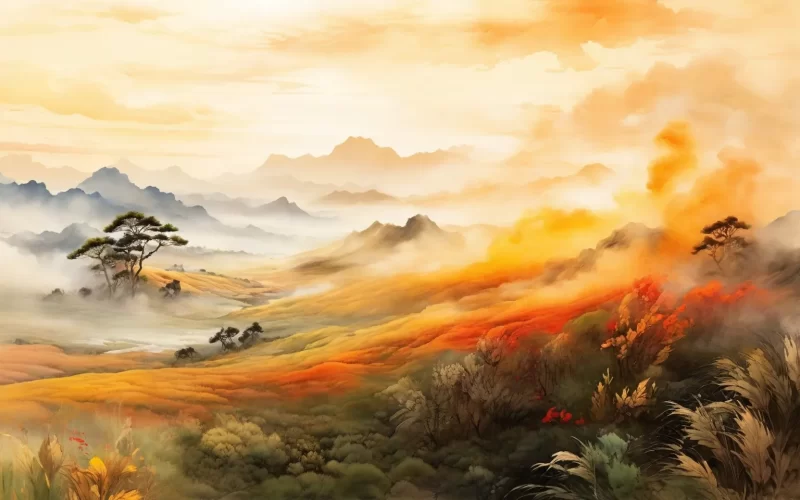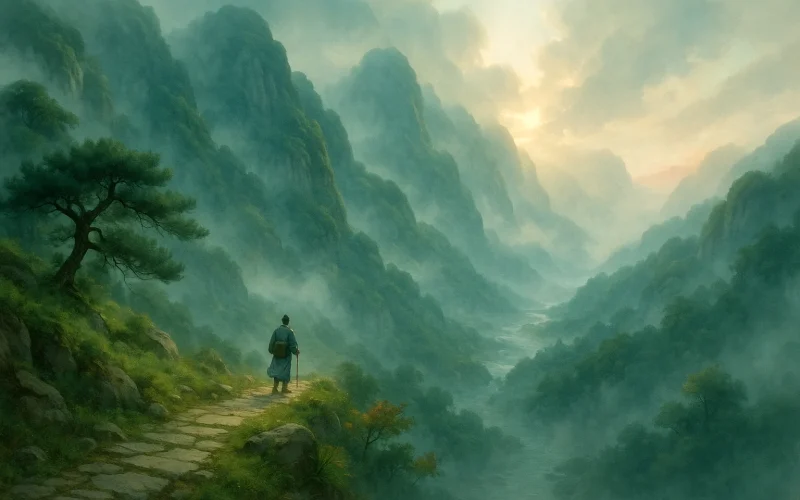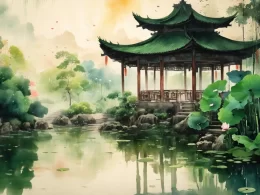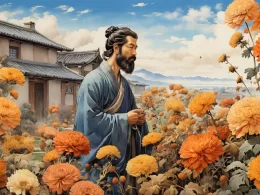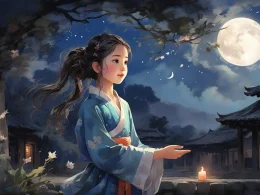Boundless grasses over the plain
Come and go with every season;
Wildfire never quite consumes them --
They are tall once more in the spring wind.
Sweet they press on the old high- road
And reach the crumbling city-gate....
O Prince of Friends, you are gone again....
I hear them sighing after you.
Original Poem
「草」
白居易
离离原上草,一岁一枯荣。
野火烧不尽,春风吹又生。
远芳侵古道,晴翠接荒城。
又送王孙去,萋萋满别情。
Interpretation
This widely celebrated poem was composed in 787 CE, during the Zhenyuan era of Emperor Dezong, when Bai Juyi was sixteen. It was a practice piece for the imperial examinations. Following the conventions for such prescribed topics—indicated by the prefix "Fu De" (赋得)—the poem had to adhere strictly to the set theme and a formal structure. In this youthful exercise, however, Bai Juyi transcended the typical constraints of examination verse. He seamlessly fused the description of an object, the painting of a scene, the sentiment of farewell, and a meditation on life's philosophy, displaying a precocious poetic talent and profound insight. The couplet featuring "the prairie fire" not only became an immortal masterpiece but also laid the foundational cornerstone of his future as a preeminent poet.
First Couplet: 离离原上草,一岁一枯荣。
Lí lí yuán shàng cǎo, yī suì yī kū róng.
Grass on the plain, luxuriant, spreading wide; / Each year it withers once, and once in glory grows.
Explication: The poem opens with the vast "plain" as its backdrop. "Luxuriant, spreading wide" vividly depicts abundant growth, immediately establishing the scene. It then states a natural law with the simplicity of a proverb: "Each year it withers once, and once in glory grows." This line contains a deep observation on time's passage and the cycle of all things. It does not merely describe grass but sets the poem's philosophical tone of perpetual regeneration.
Second Couplet: 野火烧不尽,春风吹又生。
Yěhuǒ shāo bù jìn, chūnfēng chuī yòu shēng.
No prairie fire can ever burn it all to ground; / When spring winds blow, it surges from the earth, reborn.
Explication: This couplet is the soul of the poem. It creates powerful tension between the starkly opposing forces of "prairie fire" (destruction) and "spring winds" (renewal). "Can ever burn it all to ground" and "surges from the earth, reborn"—one a definitive negation, the other a vigorous affirmation—are stated with resolute finality, celebrating the grass's tenacious vitality to its extreme. This line transcends mere description, rising to become a symbolic declaration about the resilience of life and the permanence of hope. Its philosophical depth and artistic power are unparalleled.
Third Couplet: 远芳侵古道,晴翠接荒城。
Yuǎn fāng qīn gǔ dào, qíng cuì jiē huāng chéng.
Its distant fragrance steals upon the ancient trail; / Its sunlit green merges with the crumbling town.
Explication: The perspective shifts from the vertical cycle of time to the horizontal expanse of space. The verbs "steals upon" and "merges with" are dynamic and potent, imbuing the spring grass with a sense of active, encroaching vitality. "The ancient trail" and "the crumbling town" introduce a feeling of historical desolation and decay. In contrast, the grass's "distant fragrance" and "sunlit green" inject a vibrant, present vitality into this aged landscape. Here, the enduring cycle of nature and the transience of human creations form a poignant, silent contrast.
Fourth Couplet: 又送王孙去,萋萋满别情。
Yòu sòng wángsūn qù, qī qī mǎn bié qíng.
Again I see a princely friend upon his way; / The farewell feeling deepens in the lush, green sway.
Explication: The final couplet reveals the poem's occasion of "farewell," skillfully alluding to the Chu Ci line, "The prince journeys forth, not to return; the spring grass grows, abundant and green." "Again" suggests the recurring, inevitable nature of parting. "Lush, green sway" describes the grass's appearance while metaphorically conveying the thickening weight of sorrow. Here, the image of the grass completes its perfect evolution: from natural object, to universal symbol, and finally into a vessel for human emotion. Description, philosophy, and lyrical feeling merge into an indivisible whole.
Holistic Appreciation
The poem's brilliance lies in its precise structure and layered progression of meaning. Using "grass" as its unifying thread, it connects all four couplets: The first couplet establishes the theme, stating the constant principle of nature's cycle. The second couplet elevates it, celebrating the indomitable force of life's rebirth. The third couplet expands the view, depicting the pervasive presence of this vitality in space. The fourth couplet draws the focus inward, expressing the common sentiment of human parting felt within that scene. It moves from cosmic law to human affairs, from the eternal to the momentary, with both visionary scope and logical clarity. The young poet perfectly fused his insight into natural law, his praise for life's force, and his valuing of human bonds into forty characters, demonstrating a depth of philosophical thought and artistic mastery far beyond his years.
Artistic Merits
- Perfect Fusion of Description and Philosophy: The "grass" is both a concrete image and an abstract symbol of vitality. Through the contrasting dynamics of "withers… grows," "burn… reborn," and "steals upon… merges with," profound reflections on existence and perseverance are embedded within vivid natural observation.
- Precise Parallelism with Dynamic Energy: The two middle couplets exhibit masterful parallelism: "prairie fire" pairs with "spring winds"; "burn it all" with "surges… reborn"; "distant fragrance" with "sunlit green"; "steals upon the ancient trail" with "merges with the crumbling town." This formal discipline does not constrain the poetry but, within its structure, generates a powerful sense of life's momentum and spatial expansiveness.
- Natural and Resonant Use of Allusion: The final couplet adapts a classical motif seamlessly. It fits the farewell theme while using "lush, green sway" to echo the earlier descriptions, allowing literary tradition, the immediate scene, and present emotion to resonate as one.
- Simple Language with Profound Resonance: The poem uses no obscure words or ornate phrasing. Yet, through the vast consciousness of time, life, and connection it conveys, it achieves a deeply moving power. This embodies the ideal of "profound meaning conveyed through simple, graceful words."
Insights
This masterpiece transcends the categories of farewell or nature poetry. It is a solemn ode to life, time, and enduring hope. It tells us that an individual life may undergo cycles of "withering and growth" and trials by "prairie fire," but the essence of life possesses the unstoppable power to be "reborn." Though the human world is marked by the decay of "ancient trails" and "crumbling towns" and the repeated sorrow of seeing "a friend upon his way," the perpetually returning "sunlit green" and "distant fragrance" of nature perpetually offer the human heart solace and hope.
The poem reveals that in facing life's adversities ("prairie fire") and inevitable farewells, we would do well to learn the resilience of grass—to be deeply rooted, and to await the "spring winds" of change with quiet fortitude. The young Bai Juyi announced his genius with this poem. Not only did it establish his literary career, but also, across a thousand years, it continues to offer spiritual strength to those facing hardship. It reminds us that true strength lies in maintaining the belief that life will "surge from the earth, reborn," even after fully acknowledging its cycles and trials.
Poem translator
Kiang Kanghu
About the Poet

Bai Juyi (白居易), 772 - 846 AD, was originally from Taiyuan, then moved to Weinan in Shaanxi. Bai Juyi was the most prolific poet of the Tang Dynasty, with poems in the categories of satirical oracles, idleness, sentimentality, and miscellaneous rhythms, and the most influential poet after Li Bai Du Fu.






